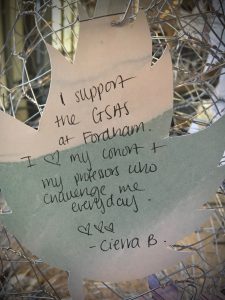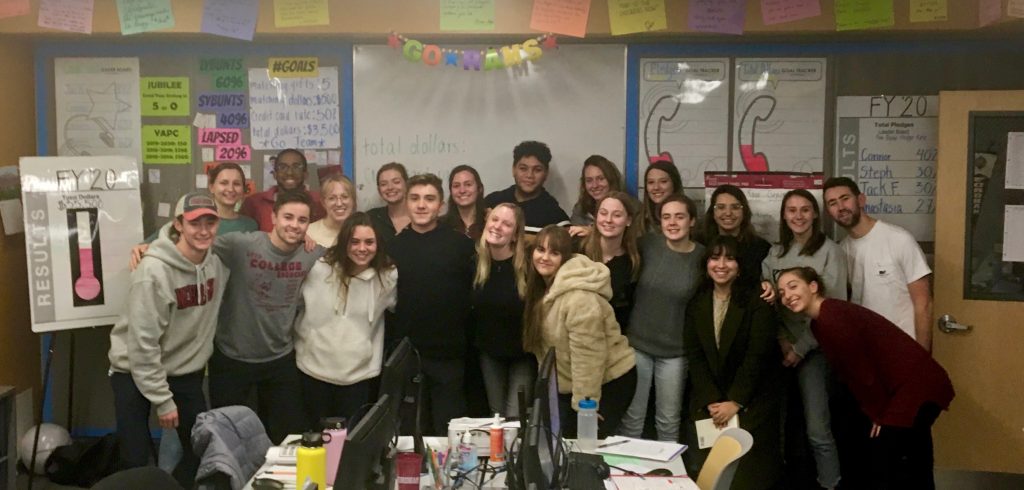The fund dovetails with one of the key priorities of Fordham’s recent fundraising campaign, Cura Personalis | For Every Fordham Student, with its emphasis on equity and inclusion as well as the wellness of every student. Here are five examples of the numerous activities it has made possible:
No. 1: Ignatian Q.
With support from the fund, 10 Fordham students traveled to St. Louis University in April for this annual conference organized by the Association of Jesuit Colleges and Universities to promote community and spirituality among LGBTQ students. (Fordham hosted Ignatian Q in 2023 with support from the wellbeing fund.) In the words of one Fordham graduate student who attended, Tatum Allen, FCLC ’24, “it offered me a space to feel less alone as a queer person of faith.”
No. 2: Students Together for Acceptance, Respect, and Support (STARS).
Piloted last year by professors and students in the psychology department and the Graduate School of Social Service, this network brings Fordham students together with local high school students seeking to engage with LGBTQ peers, find support, and build community. Two of the high schoolers also took part in a year-long research project on LGBTQ experiences in school and presented their research at the Eastern Psychological Association Conference in Philadelphia.
No. 3: Oral History Project with SAGE Center Bronx.
Last year, undergraduate students in a communications class—titled Photography, Identity, Power—worked with residents of the SAGE center, a community center for LGBTQ seniors, to produce a digital exhibition of their photography that includes an oral history element. Students in an art class, Visual Justice, later met with the seniors and made portrait photographs of them.
No. 4: Queer Prayer Book.
The book Queer Prayer at Fordham was developed in 2023 and distributed at Ignatian Q when it was held at the University.
No. 5: NYC Interfaith Pilgrimage/Retreat
This daylong retreat at the Lincoln Center campus, held in February, centered on art as a way to explore the intersection between spirituality and queerness. About two dozen students and alumni gathered for morning presentations, toured sites important to the LGBTQ community in Greenwich Village, and reconvened on campus to produce their own art.
No. 6: Urban Plunge and Global Outreach Scholarships.
With support from the wellbeing fund, LGBTQ students received scholarships to take part in Urban Plunge and Global Outreach, two programs of the Center for Community Engaged Learning.
Sources: Fordham Campus Ministry, Center for Community Engaged Learning
]]>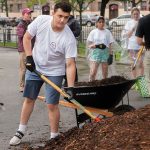
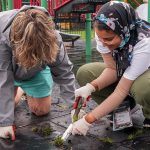
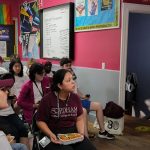
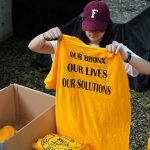
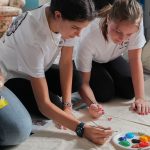
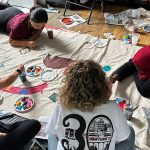
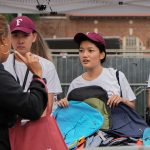
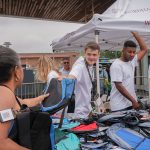
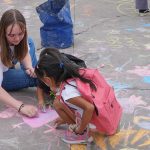
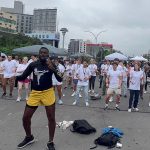
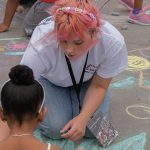
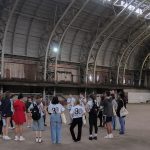 Nearly 250 first-year students fanned out across the Bronx on Aug. 25 as part of Fordham’s Urban Plunge – an annual pre-orientation program that gives new students the chance to explore the city’s diverse neighborhoods through a lens of community, diversity, and engagement.
Nearly 250 first-year students fanned out across the Bronx on Aug. 25 as part of Fordham’s Urban Plunge – an annual pre-orientation program that gives new students the chance to explore the city’s diverse neighborhoods through a lens of community, diversity, and engagement.
Students helped serve lunch to those in need at POTS—Part of the Solution, revitalized Poe Park, painted banners for one of the Northwest Bronx Community and Clergy Coalition, and did clean-up work at the community garden Drew Gardens.
A Back to School Festival that debuted last year at Fordham Plaza was also staffed by Urban Plunge students. In keeping with the philosophy that the weekend is also an opportunity for learning about their new home, students spent the morning before their service activities visiting other sites around the Bronx. In addition to tours of the Kingsbridge Armory, St. Barnabas Hospital, and the Bronx River Alliance, students visited areas along the Cross Bronx Expressway, where they learned about the highway’s impact on residents.
Urban Plunge at Fordham celebrated its 30th anniversary this year. Julie Gaffney, director of Fordham’s Center for Community Engaged Learning, which runs the program, said it’s driven by the needs of the Bronx community. That’s why health and environmental justice issues are front and center, she said.
“We really want to introduce first-year students, along with their upper-class mentors, to what’s driving community work in the Bronx right now,” she said.
“It’s an ideal ground for fostering a four-year commitment to community solution building here in the Bronx.”
Urban Plunge continued Saturday with lectures such as “What Does Engagement Look Like at Fordham.”
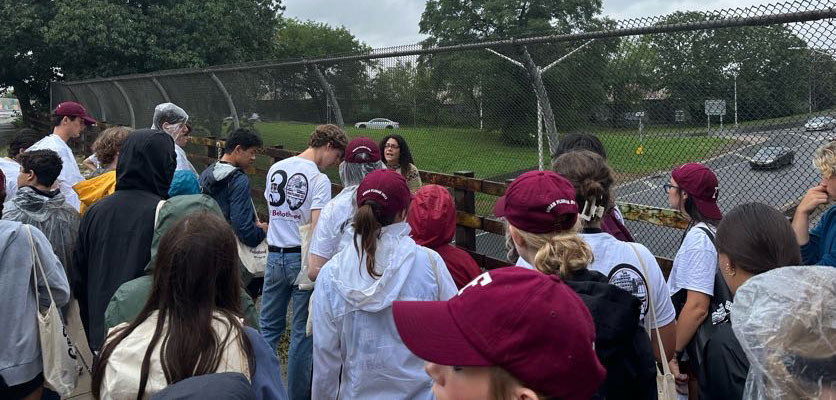
A Landmark with Untapped Potential
Mehak Wadhwa, a native of Richmond Hill, Queens, who is starting her first year studying physics/engineering, was one of the students who toured the Kingsbridge Armory, a decommissioned site with 100-foot ceilings less than a mile from the Rose Hill campus.
The tour was conducted by a representative from the New York City Economic Development Corporation, which is responsible for the site. Wadhwa found it interesting to learn about the multiple plans for the armory that have come and gone over the years and how the future of the site is still up in the air.
“I know Manhattan, Queens, and the other boroughs, but I’ve never really gone to the Bronx. I thought Urban Plunge was a nice way to get involved in the community,” she said.
She also got to ask the Economic Development Corporation rep how any plans for the armory’s redevelopment would affect the surrounding community.
“My mother is also a small business homeowner. I’ve been reading a lot about gentrification, and as a person of color, I know how it specifically impacts them,” she said.
A Park With Literary History
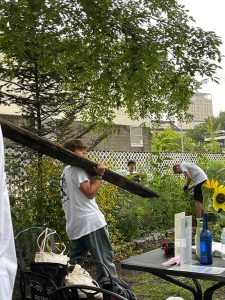
A block away, Christian Sibel, a first-year student from Collegeville, Pennsylvania, ferried wheelbarrows of fertilizer to tree pits around Poe Park, where poet Edgar Allen Poe lived in a cottage from 1846 to 1849.
Sibel, who is planning to major in International Political Economy, said the opportunity to do service work influenced his decision to attend Fordham.
“Fordham seems to be doing their best to work with the community in the Bronx, and I’m really just excited to be a part of that for the next four years. It’s exciting to explore a community different from my own,” he said. “Last night, I went out for a walk. The area is beautiful; the architecture of these buildings is incredible.”
Learning About Bronx Renewal and Advocacy
Sophie Ritz, a first-year student at the Gabelli School of Business from Westwood, Massachusetts, was one of roughly 30 students who visited the Northwest Bronx Community & Clergy Coalition on East 196 Street for several hours. There, she and her fellow “plungers” painted banners, did gardening and learned how the group, which was instrumental in the renewal of the borough during the 1970s, has now taken a lead in the push for the equitable development of the Kingsbridge Armory.
“I didn’t know we’d learn quite as much as we did. I was surprised at how hard it was for the people to do what they wanted with the armory,” she said.
“Maybe naively, I kind of figured that it’s in their community; they’d be able to do more of what they wanted with it.”
Back to School
The Back-to-School Festival brought next to 40 different community organizations to the Fordham Plaza, where a DJ spun tunes and students handed out school supplies and backpacks.
This year also featured tents across Fordham Road at Rose Hill Park. Sinhawe Haji, a native of Ethiopia who grew up in Washington D.C., was one of several students there giving away school supplies and helping children find things like trees with heart-shaped leaves as part of a scavenger hunt organized by the New York City Parks Department.
“It’s been so good,” she said. It’s sweet, seeing the smiles on their faces not only when they get the school supplies but also when they find whatever object in nature they’re looking for.”
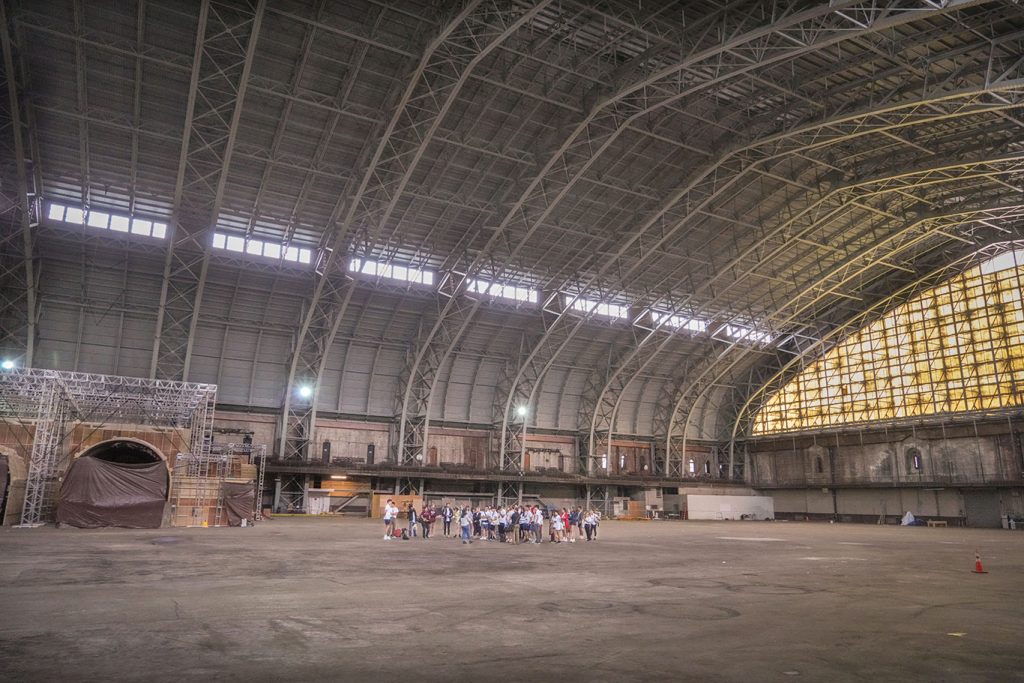
— Photos by Rebecca Rosen, MacKenzie Brown, Emma Elsdon, Bridget Flanagan, Marai Rodriguez and Christina Ou.
]]>Students in the Urban Plunge program will meet on Friday, Aug. 25, at the Rose Hill campus to discuss the Cross Bronx Expressway, a major highway that has been blamed for worsening air and noise quality and separating communities in the Bronx. In a conversation guided by Nilka Martell, founder and director of the community-based non-profit organization Loving the Bronx, students will learn about health issues associated with the expressway and Martell’s efforts to cap portions of the expressway and develop public green spaces around it.
“As someone who was born and raised and still lives in the Bronx, I can definitely attest to the fact that the largest impact of these highways is our asthma rates,” Martell said in a 2021 interview with New York Public Radio. “If you visit the Bronx and you ask anyone whether they have asthma or they know of anyone that has asthma, 10 out of 10, they will tell you yes, largely due to the existing infrastructure and the open portions of highways and the overdevelopment around these highways.”
In addition to Martell, the panel will feature three policy experts who will share their own perspective on health issues associated with the expressway, as well as how public involvement can shape policy-making: Dr. Salihah Dick, asthma program manager in New York City Department of Health and Mental Hygiene’s Neighborhood Health Action Center in the Bronx; Paul Philps, director of the New York City Department of City Planning‘s office in the Bronx; and Victor Martínez, senior policy advisor for Ritchie Torres, the U.S. representative for New York’s 15th congressional district (that covers most of the South Bronx). Following the panel, students will participate in neighborhood walks along the Cross Bronx Expressway in partnership with local community-based organizations.
“This collaboration with Nilka Martell, Dr. Salihah Dick, Paul Philps, and Víctor Martínez reinforces our institutional commitment to environmental justice, community engagement, and experiential learning,” said Julie Gafney, Ph.D., assistant vice president of strategic mission initiatives and executive director of Fordham’s Center for Community Engaged Learning. “Together, we are forging a path towards a sustainable and equitable future, aligned with Fordham’s mission and in pursuit of the Laudato Si’ goals. Our united efforts aim to achieve real and lasting solutions to protect our common home.”
The panel discussion, which will take place from 9 to 9:45 a.m. on Edwards Parade, is open to the public. The rain location is the McShane Campus Center, Room 311.
]]>Less visibly, the event also showed the power of philanthropy. Hosting Ignatian Q is just one thing made possible by a fund that is creating new momentum around the University for initiatives that support lesbian, gay, bisexual, transgender, and queer or questioning students, plus other sexual and gender minorities.
Founded last spring, the LGBTQ+ Student Wellbeing Fund is supporting everything from pastoral care to academic events and the development of classes reflecting LGBTQ+ themes—with the promise of more initiatives to come.
“I’m really encouraged and optimistic about the kind of response the fund has gotten, not only from LGBT members of the Fordham family but also straight members of our family who are deeply committed to issues of diversity, equity, and inclusion,” said Joan Garry, FCRH ’79, a former executive director of the LGBTQ+ advocacy group GLAAD and nationally recognized activist who serves on the Fordham University President’s Council executive committee.
Garry and her wife kick-started the fund last year by leading a Fordham Giving Day campaign for it and providing a $50,000 matching gift.
The need is plain, Garry said: The number of students who identify as other than heterosexual or cisgender is growing “off the charts.” These students “have all kind of struggles every day,” from self-acceptance to harassment to bullying, and suffer disproportionately from anxiety and depression, she said.
The fund is also needed because of a political climate that has become “downright terrifying,” she said, pointing to the Human Rights Campaign’s June 6 declaration of a “state of emergency” for LGBTQ+ people due to laws being enacted around the country.
By helping to foster a more inclusive campus community, the fund dovetails with a key priority of the University’s $350 million fundraising campaign, Cura Personalis | For Every Fordham Student.
Impact of the Wellbeing Fund
In addition to providing critical support to the Ignatian Q conference, the Wellbeing Fund has supported Campus Ministry programs including Queer Spirit Community and the Prism Retreat, as well as the publication of a Queer Prayer at Fordham booklet distributed at Ignatian Q, said Joan Cavanagh, Ph.D., senior director for spirituality and solidarity at Fordham.
The fund has also supported Center for Community Engaged Learning initiatives including scholarships that helped LGBTQ+ students take part in Fordham’s Global Outreach and Urban Plunge programs, a panel discussion on LGBTQ+ history, and grants for faculty. Co-sponsored by the Office of the Chief Diversity Officer, the grants support innovative classroom projects related to LGBTQ+ history and advocacy.
The Wellbeing Fund has “ignited an understanding that there is so much to do,” Garry said. “I am excited about the forward motion the fund is creating to educate, drive awareness, and galvanize support.”
Learn more about the uses of the LGBTQ+ Student Wellbeing Fund and make a gift.
See related story: Pope Francis Sends Warm Letter of Support for LGBTQ+ Conference at Fordham
]]>










 Learning about health disparities in the Bronx, planting and mulching a community garden, helping to serve lunch to those in need, and cleaning up local streets were just a few ways some first-year Fordham students started their college careers.
Learning about health disparities in the Bronx, planting and mulching a community garden, helping to serve lunch to those in need, and cleaning up local streets were just a few ways some first-year Fordham students started their college careers.
The students were participating in the Urban Plunge Program, a pre-orientation program run by Fordham’s Center for Community Engaged Learning. Students from both the Lincoln Center and Rose Hill campuses can participate in the three-day intensive program, in which they learn about the communities they’ll be living in, engage with community partners in those neighborhoods, and gain hands-on experience while working with local organizations. The students participated in walking tours of the neighborhoods, enjoyed concerts and performances, and participated in community engagement efforts. More than 230 students participated in the program this year, one of its largest groups ever.
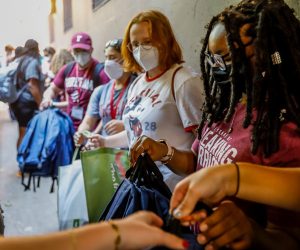
Michela Fahy, a senior at Fordham College at Rose Hill who served as a senior captain for the program this year, was part of the group working with POTS—Part of the Solution—a longtime community partner of Fordham in the Bronx. She said that she hoped the new students in the program would gain a new understanding of their communities and the people in them.
“Really just jumping headfirst into exposing themselves with themes that they might not have been familiar with, especially at POTS—they’re learning a lot about people who are experiencing homelessness, people who just might like an extra meal,” she said. “I’m encouraging them to explore and ask those questions about a lot of contemporary issues that we face in New York City. The program really does a good job of immersing them in it.”
Fordham President Tania Tetlow emphasized the importance of partnering with community organizations and hearing from the people they serve while she stopped at multiple Urban Plunge sites. The University partnered with numerous community organizations in the Bronx and Manhattan as a part of the program, including Tremont Neighborhood Health Action Center, NYCHA (the New York City Housing Authority), Amsterdam Houses Tenant Association, New York Society for Ethical Culture, and the National Action Network POTS, Drew Gardens, NYC Sanitation, the Belmont Business Improvement District, the Belmont Islamic Center, Bronx County Historical Society, The Bronx is Reading, Bronx Music Heritage Center, Bronx Zoo, Children’s Aid, Ciszek Hall Jesuits, New York City Parks Department, Gambian Youth Organization, New Settlement, New York Botanical Garden, New York City Health Department, New York Public Library, The Racial Justice Commission, VIP Community Services, and Zeina Lorraine Inc.
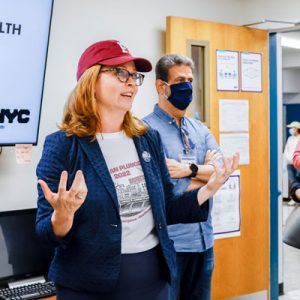
“This is just a really great place,” President Tetlow said at the Tremont Neighborhood Health Action Center, “where you see what it means to use your intellectual, analytic skills of research and combining it with serving people, and the thing that will teach us the most is actually listening to the people that we’re serving, and understanding the insights they have and the profound ways that all of this has impacted their lives.”
Anita Reyes, assistant commissioner of Bronx neighborhood health for the NYC Department of Health and Mental Hygiene, said this was the first time the Tremont Neighborhood Health Action Center partnered with Fordham for Urban Plunge.
“We think that this is a good opportunity to integrate the students, to see the communities and understand the work that’s being done in these communities,” she said.
Reyes added that they were really excited to “have Fordham in our house.”
“This is really a community effort, and we’re hoping that this can grow,” she said.
Yazmine Sibiski, a first-year Fordham College at Rose Hill student from New York, said that she found out about Urban Plunge through pre-orientation events and knew that it was something she wanted to do.
“I’ve always had an interest in the human rights and social justice fields,” she said, adding that she created a human rights club at her high school. “This is a really great way for me to see different insights because I believe that it’s really important to hear other opinions, especially when you’re trying to make change, you have to know your environment.”
At Drew Gardens in the Bronx, a long-standing community partner, students worked with volunteer Mario Figueroa to plant and mulch at “one of the largest community gardens in the Bronx.” The work was especially important as the garden had been closed for a few months after an issue with the State Department of Transportation over registration and insurance.
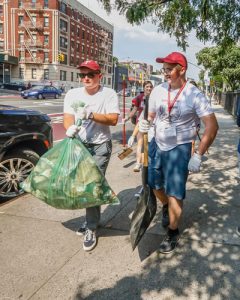
Figueroa said that the community rallied to support the garden and they were able to work out the situation and reopen the space.
“This land is still sacred and we do what we do because we’re local residents and there’s a passion to be here,” he said.
Lola Velez, a first-year Gabelli School of Business student from Puerto Rico, said she wanted to be immersed in the community she was moving to.
“I wanted to get out of my comfort zone and everyone’s usually talking about ‘the city,’ but I wanted to get to know where we are, which is the Bronx,” she said.
First-year Fordham College at Rose Hill student Noah Lucia said that he worked with New York State Senator Samra Brouk over the summer and saw the legislative side of community work, so he was interested in learning more about grassroots efforts.
“I did Urban Plunge because I worked in the New York State Senate, and just seeing the ways you can give back to the community in a positive way, and especially renewal efforts, like Urban Plunge—going in and seeing how privileged we are—really offers us [a way]to see different perspectives, especially coming from Rochester where I’m from,” he said.
Jackson Lewis, a senior at Fordham College at Lincoln Center who is pursuing a five-year accelerated master’s program in English, said that he wanted to participate as a student leader in the program because of his “formative experience” at Urban Plunge as a first-year student from California.
“I think it really just reinforced my commitment to social justice, social action, community engagement,” he said. “The notion that you can come back [to Urban Plunge]and support people in the way that you were supported was something that was just irresistible to me.”
]]>“He never let [his cancer diagnosis] get him down—he lived life to the fullest,” his mother, Roberta Schaefer, said. “That’s the kind of guy he was. He charmed whole wings of the hospital [and] they showed up at his memorial Mass because he showed up with kindness all the time.”
Schaefer earned a B.A. in history from Fordham with a minor in theology in just three years, and he left his mark on the University and its community in numerous ways. After participating in Urban Plunge, he helped lead the pre-orientation program that gives first-year Fordham students a chance work with community partners on service and social justice projects as they get to know the city. He also worked as a service leader for the former Dorothy Day Center (now known as the Center for Community Engaged Learning); a resident assistant; and a dedicated employee of the Church of St. Paul the Apostle, across the street from the Lincoln Center campus.
“He exemplified each of the Jesuit tenets that Fordham stands for the best out of anybody,” his friend Leighton Magoon, FCLC ’17, said. “I feel like that’s what tied him to Fordham—Fordham has the Jesuit tenets of cura personalis, of men and women for and with others—and he took the Jesuit tenets Fordham stands for and truly lived his life according to that.”
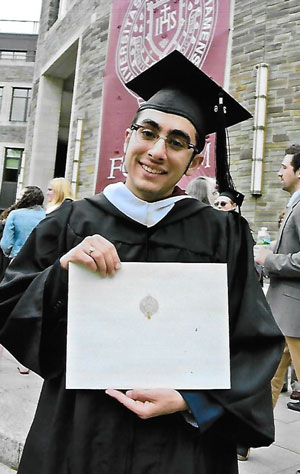
Dylan Penza, FCLC ’16, said that Schaefer helped him get him a job at St. Paul’s, and their friendship changed his life.
“Being his friend helped me like myself more,” Penza said. “I couldn’t believe that a dude that kind, that nice wanted to hang out with me, especially at the beginning of college [when] I was pretty cold, detached, and distant from people, and I was sort of going down a path I didn’t really love. Him getting me that job and him being one of my friends—it really helped me to start to figure out what parts of me I liked and what parts I wanted to grow.”
Penza said that Schaefer excelled at being there for others. He recalled a time when the two of them were working a shift together at St. Paul’s, and a couple of tourists from Eastern Europe who didn’t speak English came in to find help because they were lost.
“Ian pulled up Google Translate and helped these tourists figure out where they were going, and he didn’t even bat an eye,” Penza said. “That’s just the kind of guy he was.”
Magoon described Schaefer’s “care for others” as “infectious.”
“He made you want to care for others as much as he cared for you,” he said. “He was just this fantastic person, fantastic man—he made you feel good just from the slightest interaction with him.”
‘The Mayor of Rochester’
After graduating from Fordham, Schaefer earned his master’s degree in public administration from the SDA Bocconi School of Management in Milan, Italy. He then returned home to Rochester—in part due to his cancer diagnosis, according to his mother—and worked as an assistant to the chair of the Department of Foreign Languages and Literatures at Nazareth College and then as an office clerk for the town of Brighton, New York.
Ian’s dad, Jack Schaefer, recalled visiting his son in Milan.
“He befriended a chef in the cafeteria and they became, of course, lifelong friends,” Jack Schaefer said.
The whole family went to visit the chef for dinner at his home, and they were walking back to their hotel late at night when they saw someone walking toward them. Jack Schaefer said the streets weren’t well lit, and he didn’t know where he was going, so he felt a little apprehensive.
“All of sudden this guy raised his hand and yelled, ‘Ian!’ with a smile on his face and came over and chatted,” he said. “Thousands of miles from home, late at night, my son finds a friend.”
Penza said that was par for the course when going out with Schaefer.
“The last time I saw him, Ian and I decided to go to a bar to hang out, and as we get out of his car, there’s some person that he knows and that he’s friends with, and then we get into the bar and there’s two guys that he knows, that he’s friends with,” Penza said with a laugh. “He’s like the mayor of Rochester. Everybody knew him.”
‘A Gentleman and a Scholar’
Faculty and administrators also remember Schaefer as a joy to be around, as well as an excellent student.
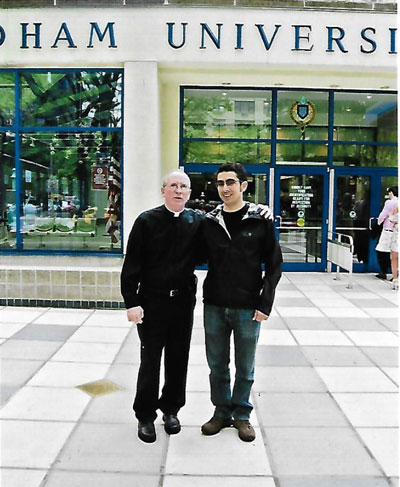
“I was privileged to know Ian at Fordham and to enjoy his intellectual curiosity and his joy of life which was so infectious,” said Vincent DeCola, S.J., assistant dean at the Gabelli School of Business. “From winning ‘Freshman of the Year’ to being a welcoming presence on campus, Ian united our community by the love he manifested to all.”
Joseph Desciak, Ph.D., former first-year dean at Lincoln Center and now an associate dean at Boston College, said that Schaefer was “the most extraordinary student I’ve known at Fordham.”
“His love of humanity and welcome to all persons was both an inspiration and gift. He was a gentleman and scholar. He was always the same: a loving, brilliant, compassionate man. He’s changed me for the better, and I will always be grateful for our friendship.”
Schaefer also interned at America magazine, a Jesuit publication, where he worked with James Martin, S.J., its editor-at-large.
“As anyone who knew him would know, Ian was kind, funny, smart, thoughtful, and an absolute joy to be around,” Father Martin said. “He had a ready laugh and an even readier wit. All who knew him enjoyed his company; and all who knew him well loved him. May he rest in peace and may God console all who knew and loved him.”
His mother said that Schaefer had recently been rereading one of Father Martin’s books, The Jesuit Guide to (Almost) Everything, with his girlfriend, Emmarae Stein. She is currently in the process of becoming a Catholic, Roberta Schaefer said, and asked the Schaefers to be her godparents.
“She’s been amazing to our family,” Roberta Schaefer said. “Ian’s memory lives on—he grew our family even after he was gone.”
Schaefer is survived by his parents, John and Roberta Schaefer, and his girlfriend, Emmarae Stein.
]]>Gafney arrived at Fordham two years ago as the center’s director of administration and academic development after several years in higher education as an instructor, administrator, and independent consultant. She started during a time of restructuring within the Office of Mission Integration and Planning, which included launching the center to bring together established community outreach programs alongside service learning curricula.
Gafney will now oversee marquee programs like Urban Plunge, the pre-orientation program that introduces first-year students to the city through service, and Global Outreach, which partners with community-based organizations at home and abroad to help students better understand social justice issues at the ground level. On the academic side of the house, Gafney will continue to build on her work with faculty to facilitate curricular offerings that include engagement with the community.
“My background it the humanities and the liberal arts laid out a path where I fell in love with teaching, but then I began to look at more systemic ways to create policies that put relationships with people first, which is essential in education,” she said.
A graduate of Tufts University and the University of Chicago, Gafney earned her doctorate from the City University of New York Graduate Center. Mentoring and teaching students at Hunter College and John Jay College sparked an interest in student success.
“I began asking questions about what gets students into college, how they persist, and what they need to complete college on time,” she said.
She later consulted for colleges and universities throughout New York state to develop and evaluate STEM programs with the ultimate goal of recruiting students from historically underrepresented backgrounds. Having fostered an interest in the nut-and-bolts of higher education, she arrived at Fordham tasked with growing the University’s community-engaged approach to coursework, she said.
“A community engaged class takes up a social justice concern or problem or topic and applies it to that class through community engagement,” she said. “It could be an organic chemistry class that deconstructs an environmental justice issue or a sociology class that examines redlining.”
Gafney said that while there was a strong tradition of service learning at Fordham when she arrived, the Center for Community Engaged Learning offers many more opportunities for students to get involved in community-based work through their undergraduate courses. Today, community engaged learning classes to ask each student to take on a direct service or project-based experience, along with two written assignments and a thoughtful reflective practice, such as journaling or a set of in-class discussions that unpack their experience.
These courses have increased in number dramatically as well. In the 2014-2015 school year there were seven service learning courses offered; this school year there were 52 community engaged courses supported by the center. Gafney credited several faculty members–whom she referred to as “expert practitioners”– with helping lay the groundwork for what is now a wide array of course offerings across disciplines.
CCEL provides support to faculty by connecting them with appropriate community based organizations that have an established relationship with Fordham. Gafney also facilitates faculty workgroups that meet eight times a semester to workshop course proposals. The group delves into the pedagogy of teaching a community-based course, she said, and “interrogates systems of racism” while discussing how to hold those difficult conversations in a classroom. The fact that she is a white woman facilitating conversations on race has not been lost on her.
“I am approaching a lot of this work as a student and learning from my staff, other leaders in the field, and from our partners,” she said. “I see this learning and developing myself as iterative, under construction, and something that I must return to every day.”
On her nightstand at the moment are books by Ibram Kendi, Michelle Alexander, and Bryan Washington, she said.
“I’m deeply committed to anti-racism in everything I do,” she said, after crediting several colleagues from across the University who she said have helped her deepen her understanding of racism. She added that the pandemic and recent Black Lives Matter protests have underscored inequities that CCEL has sought to address in its programming.
“Even more than in ordinary times, we really see the importance of community-based solutions,” she said. “We’ll be looking to our partners to see how they’re approaching this political, cultural, and social change, as well as a rising awareness around injustice and human rights violations in this country.”
Gafney said that the post-pandemic world could offer society an opportunity to realign its principles. She drew parallels to her research on 14th-century secular writing in England, France, and Italy to what that world might look like. She noted that in years after the plague, writers often employed the motif of the Garden of Eden as a stand-in for a newly constructed society.
“It was a way to think about how to construct a new society after the destruction of an urban society,” she said. “Then as now I hope for a restructuring of problematic hierarchies, like who has power and how it is used. Because in these moments of flux that we don’t wish for, that is when we can re-valuate what is possible.”
]]>In short, self-recorded videos—most are about two minutes long—respondents discuss how they live Fordham’s mission in their careers and personal lives, how it inspires them to engage with the issues of our time, and more.
Cultivating Connection and Community
In the first episode, Donna Rapaccioli, Ph.D., dean of the Gabelli School of Business and a 1983 Gabelli School graduate, said her Fordham education taught her to look for God in everyone.
“This search to find God in all things has helped me see beauty and wisdom in unusual places, including mistakes I have made and losses that I have experienced,” Rapaccioli said. “It’s also helped me lead difficult conversations and to humanize my colleagues who have goals that don’t seem to align with my goals, by stepping back and reflecting on the profound premise that God is in everyone.”
Other respondents, such as Daniel Groff, a 2020 Gabelli School graduate, have reflected on the lasting friendships they fostered while studying at Fordham.
“These aren’t surface-level friendships where it’s just people I hang out with on the weekends,” Groff said. “I’m so grateful that Fordham provided that type of community that allowed these friendships to grow and continue to grow after my time at Fordham … and I’m excited, as I enter this next stage of my life, to continue growing those relationships.”
Finding Inspiration in and out of the Classroom
In her reflection, Nina Heyden, FCRH ’17, credited Fordham’s Urban Plunge and Global Outreach programs for helping her connect with people beyond the Fordham community, sharing in their stories and experiences in a way that profoundly influenced her career trajectory.
During an event Fordham hosted when she was an undergraduate, Heyden had an opportunity to speak with the caterer, a local restaurant owner who “shared a really tough story” of how she and her family were facing “displacement due to the gentrification that was going on in the Bronx.”
“That got me thinking of all of the others who must be going through this systemic injustice as well, and was one of the motivating factors for me to turn to a research career and go into data science and statistics, to be able to provide concrete truths through numbers and take stock of all the people going through injustices,” Heyden said. “I feel really lucky to be able to do that.”
Loreen Ruiz, a Fordham College at Lincoln Center senior and the president of United Student Government at Lincoln Center, shared how she decided to major in theology despite identifying as agnostic.
“I’ve always had a complicated relationship with religion,” Ruiz said. “I was disappointed to find that theology classes were required as part of the core curriculum. I’d been avoiding religion and going to church for the past few years—this time, I had no way out.”
Ruiz said that, contrary to her expectations, the core classes offered her an opportunity to delve into and unpack the difficult religious questions about which she’d always wondered. “I quickly realized that these classes’ purpose was to teach critical thinking, and to examine religion from a historical and philosophical angle,” she said. “I began to lean into class discussions. … I found them so interesting that I declared my major in theology and never looked back.”
She added that, thanks to Fordham, she’s been better able to connect with her religious family and understand their perspectives because she treats “religion with respect, not disdain.”
Seeking Social Justice
Gregory Louis, LAW ’09, shared how he has used his Fordham Law education to work toward greater social justice, both through community lawyering and as a professor at the City University of New York’s School of Law.
“The motto of my current school … is the ennobling ‘Law in the Service of Human Needs,’” Louis said. “My Fordham Law education prepared me to join in this mission as a Catholic because it instilled in me the ideal of faith in the service of humanity.”
He added: “The zeal generated in the classroom drives you out into the world and, in my case, to the clinical program at Fordham Law and then to the community, lawyering out on the streets of New York. This happened because Fordham instilled in me a sense that … legal knowledge means absolutely nothing if it’s not immediately employed to and invested in the struggle for justice.”
In an interview, Louis added that he hopes his and other Magis Minute videos will invite some deeper reflection on “what it means to be a Jesuit university and, most importantly, how this engages with this broad question of schools that are having to think through their complicity in not advancing the rights of others.”
Sowing the Seeds for Reflection
Julie Fissinger, executive director of the President’s Council, is one of the organizers of the Magis Minute project. She said that as the dual pandemics of COVID-19 and racism wore on over the summer, she was looking for ways to foster a sense of social connection to unite people at Fordham despite the need for physical distancing.
“One of the most consistent things you hear [from students and alumni]is about the [value of the]Jesuit education that people receive at the University,” Fissinger said. She started thinking about how Fordham has its own “internal gems of resources,” and she wanted to hear from people “about their own experiences and how it’s impacted their lives.”
She teamed up with Matthew Burns, associate director for young alumni and student engagement; Kathryn Mandalakis, assistant director of the Fordham Fund; and Blain Bradley, leadership annual giving officer; along with Erin Hoffman, associate director of Campus Ministry, director of Ignatian Initiatives, and resident minister.
“I hope they can help be a positive and unifying moment for members of our community at a time when we face so many challenges in the world and are separated from one another in so many ways,” Hoffman said, adding that she hopes the series “can create enthusiasm about Fordham and showcase the numerous ways people connect with Fordham and grow during their time here.”
Engaging a Wider Community
According to Burns, “the goal is to make this as diverse as possible—students, parents, faculty, alumni, followers of non-Christian faiths (or none at all).” Fissinger added that project organizers would love to hear from staff who work in facilities, the cafeteria, and other areas of the University. “They’re not faculty, they’re not students, but I think they’re touched by the culture of the institution as well.”
Fissinger also said she hopes to engage community partners as well. In a more typical year, students are heavily involved in service projects around the city and in the local Bronx community. Bronx nonprofit leaders who meet Fordham students through programs like Urban Plunge, for example, could be invited to “talk about that relationship with the University and the students,” she said, “and the impact of that kind of programming on local communities.”
Hoffman added that she and her colleagues “take seriously our hope that the series reflects voices from a wide variety of perspectives within the Fordham community, and we seek to be attentive to diversity of many types when we invite people to participate.”
The Magis Minute team is always looking for nominations and volunteers. Email Blain Bradley at [email protected] to nominate the next Magis Minute respondent. New videos are posted every Thursday on the alumni website, Forever Fordham, and on social media.
]]>The fellowship was created to help train future leaders in public service. Fellows spend nine months focusing on civic engagement within various organizations, and develop a final independent project in cooperation with an agency of their choice.
Patterson, who majored in women, gender, and sexuality studies and took both pre-med and pre-law classes at Fordham, said she plans to use the fellowship to learn cross-sector approaches to eradicating health disparities in New York City.
Growing up as a Jamaican immigrant in Mount Vernon, New York, Patterson saw many of these injustices firsthand. At Fordham, she dedicated much of her time outside the classroom to fighting or bringing awareness to these inequities. As a senior she was president of ASILI—Fordham’s black student alliance—and she participated in several Global Outreach projects. She credits her Fordham Fund Scholarship with allowing her to immerse herself in the full Fordham experience.
Patterson became especially passionate about issues of racial injustice through her work with Urban Plunge, an optional pre-orientation program run by Fordham’s Center for Community Engaged Learning.
Over a three-day period at the beginning of her first year at Fordham, Patterson participated in one of several community-enriching programs offered throughout the Bronx and Manhattan. She loved the program so much that she became an Urban Plunge assistant for the next three years.
“It was a transformative experience that I think … planted the seeds in my mind for all of this,” she said. “It allowed me to become more social justice oriented as I was looking into a career in the health profession. I started to understand the racial inequality and health disparities within our current system.”
Patterson wrote her thesis on the relationship between African American women and the American health care system. “My Fordham education has helped guide my decision-making,” she said. “Fordham allowed me to follow my passions and has challenged me to become my best self.”
Now through the Coro Fellowship, Patterson is working with the executive vice president for strategy and innovation at the New York City Housing Authority, more commonly known by its acronym, NYCHA.
“Coro is providing me with inquiry tools, leadership training, and exposure through hands-on learning that I don’t think I would have gained elsewhere,” Patterson said. Next, she plans to apply to law school or pursue a master’s in public health.
“With this fellowship, I do feel like I am closer to achieving my goal,” she said.
]]>“We had a record-breaking Giving Tuesday,” said Elaine Ezrapour, director of the Fordham Fund. “It’s very exciting to see the outpouring of ‘phil-‘Ram’-thropy.’”
Held this year on Dec. 3, Giving Tuesday, the Tuesday after Thanksgiving, has become an international day of charitable giving. Since 2015, Fordham has raised hundreds of thousands of dollars each year on this day. But 2019 marked the first year that the University raised more than a million.
Supporting Athletics
The majority of the 1,589 gifts made this year were for Fordham athletics. More than $300,000 in gifts will help support the Frank McLaughlin Family Basketball Court and University sports teams. That includes the Fordham men’s rugby football team, which is raising money to fly to Ireland for the club’s first international tour in more than 50 years.
“Working with the Fordham Fund, we’ve created a Give Campus page for each of the varsity and club teams,” said Edward Kull, senior director of development and senior associate athletic director, adding that the student-athletes and coaches create videos for their teams letting everyone know what their needs are. “So it’s a real collaborative effort.” Squash, crew, football, water polo, and sailing were among the top raisers, he said.
Scholarships for Urban Plunge
More than $6,000 was raised for scholarships for Urban Plunge, a pre-orientation program where first-year undergraduate students participate in community service activities throughout the Bronx and Manhattan. The program, run by the Center for Community Engaged Learning, requires a $250 fee for each student that pays for their meals, transportation, and supplies.
A Double Giving Challenge
This year’s Giving Tuesday offered Rams a double challenge. If 350 donors made a gift by 11:59 a.m. EST, then Susan Conley Salice, FCRH ’82, and Thomas P. Salice, GABELLI ’82, would contribute $20,000. After the goal was achieved, the Salices presented the second half of the challenge: If 200 more donors made a gift by 11:59 p.m. EST, the couple would give another $20,000 to Fordham. Thanks to 550 donors, both challenges were met and the Salices donated $40,000.
Student Support
Students across the University helped spearhead donation efforts, too. In O’Hare Hall, student callers reached out to dozens of alumni, parents, and friends of Fordham. Usually, they work three hours a day, Ezrapour said. But on Giving Tuesday, they worked from roughly 10 a.m. to 10 p.m. and secured 150 gifts over the phone.
Further downtown, the Student Philanthropy Committee at Lincoln Center set up a tabling session in the Lowenstein Center. For the first time, they created a “giving tree” fashioned out of chicken wire and multicolored leaf cut-outs. Committee members asked passing students to write on a leaf the things they are grateful for at Fordham—including causes they want to support in the future.
“They wrote wonderful notes about the different areas on campus that they feel connected to and care about,” Ezrapour said. “It was a great effort on their part, not only in raising awareness about Giving Tuesday, but also demonstrating to the campus community just how many potential areas there are to support.”
]]>